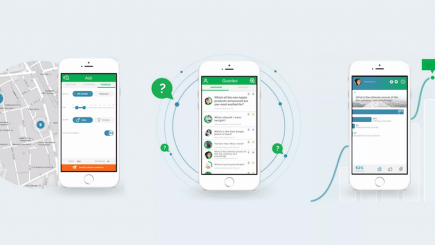Danish getQueried wants to collect the opinions of the World – and entertain users at the same time.
You’re having the most awesome house party, but it’s getting late so you need to pop the annoying question “where should we head to next?”. This is certainly not your favourite moment – There’s always at least two or three different bar options and in the worst case some guests head home just because you just couldn’t make the decision together.
Wonder if the night would end differently if you could make a quick mobile survey of those options? Here’s where Danish getQueried wants to come in.
GetQueried enables anyone to ask questions to specific target groups. The app could be characterized as a mix between Snapchat and ask.fm. You ask a question and then you take up to four photos and send it to your friends or random people. You can sample your target group by age, gender and distance so that only the right people receive the question. Then it’s just for you to sit back and wait for the answers.
But there is more. Say you want to collect a large number of answers for your assignment or to validate your startup business idea. The app is there to help by putting their community to the task of answering your questions in exchange for prizes. Their goal is to enable anyone to gather representative data within 24 hours anywhere in the world.
Some might call this type of service market research or panel data, but getQueried calls it ‘Advanced Questions and Answers Service’.

Steven Højlund, the founder and CEO of getQueried, believes that they can tackle several major industry problems by combining a market research business model with a community. The problem in market research panels is that the response rates are dropping, since people avoid answering to long email questionnaires.
“We want to make questions engaging. By doing that we can solve the problem with low response rates, and then we can enable anyone to ask questions to a representative sample of their target group. This means anyone with an access to the Internet would be able to produce social knowledge about attitudes anywhere in the world. It is sort of like democratizing knowledge about human attitudes,” Højlund describes.
Engaging users through meaningful data
According to Højlund, the technological side of the service isn’t rocket science, but getting people to answer to the questions is the biggest thing. And that’s why they’re creating an engaging service through gamification and want to build a sense of community.
When users can get data from their peers – it also creates more value for them, says Højlund:
“When the service is constructed to be social, it attracts people more likely. Peer pressure motivates people more than economic incentives.”
Question about data security: Acknowledging the risks or moving to the woods?
As the company collects and registers lots of data of the users on the platform, data security is very important to getQueried. According to Højlund, the strict data protection legislation in the European Union should be considered a key selling point in the future to come:
“We want to provide a platform that people can trust. We share log files with the users and ensure that they have the right to be forgotten from the system. That is the logical consequence of moving away from the Wild West-attitude to data protection of the 2000’s.”
While asking about the risk of frauds, Steven Højlund tells that they connect the user profiles to Facebook to check if users are who they claim to be – and an algorithm regularly tests if they answer to surveys consistently.
“It’s the power of numbers so if 1% of the people is a fraud, we’ll still get precise estimates with thousands of respondents,” Højlund ensures. But actually due to research, people answer more honestly on surveys than face to face questionnaires, he adds.
GetQueried was founded in November 2014 by Steven Højlund and Christian Thode Larsen, and the company has opened their survey platform to the users in Denmark. After successful launch, the company concentrates on acquiring users – and keeping them.
“Of course we need people who want to answer to questions.”





